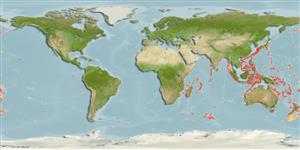Environment: milieu / climate zone / depth range / distribution range
Ekologi
marina djupbottenlevande; djupintervall 256 - 711 m (Ref. 35812). Deep-water
Indo-West Pacific: Zanzibar, Tanzania and Madagascar to southern Japan and the Philippines.
Size / Vikt / Age
Maturity: Lm ? range ? - ? cm
Max length : 23.0 cm SL hane/ej könsbestämd; (Ref. 26165)
Rarely caught.
Life cycle and mating behavior
Maturities | Reproduktion | Spawnings | Egg(s) | Fecundities | Larver
Quéro, J.-C. and C. Ozouf-Costaz, 1991. Ostracoberyx paxtoni, nouvelle espèce des cötes est de l'Australie. Remarques sur les modifications morphologiques des Ostracoberyx au cors de leur croissance (Perciformes, Ostracoberycidae). Cybium 15(1):43-54. (Ref. 35812)
IUCN Red List Status (Ref. 130435)
Threat to humans
Harmless
Human uses
Verktyg
Special reports
Download XML
Internet-källor
Estimates based on models
Preferred temperature (Ref.
123201): 6.8 - 14.5, mean 10.3 °C (based on 340 cells).
Phylogenetic diversity index (Ref.
82804): PD
50 = 0.7500 [Uniqueness, from 0.5 = low to 2.0 = high].
Bayesian length-weight: a=0.01995 (0.00906 - 0.04395), b=3.01 (2.83 - 3.19), in cm total length, based on all LWR estimates for this body shape (Ref.
93245).
Trofisk nivå (Ref.
69278): 3.5 ±0.5 se; based on size and trophs of closest relatives
Fishing Vulnerability (Ref.
59153): Low vulnerability (18 of 100).
